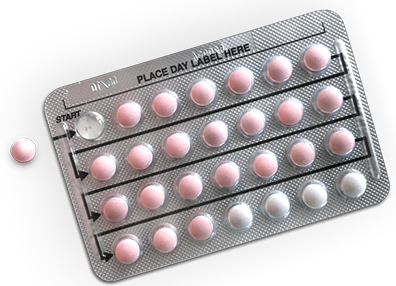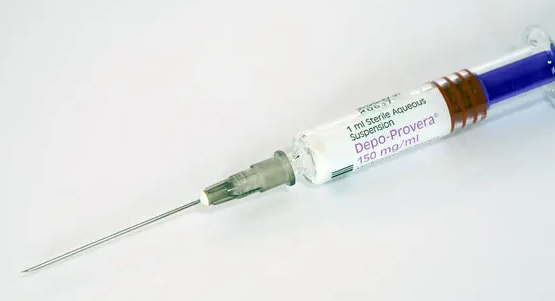Science > Biology > Human Population and Population Control > Other Methods of Contraception
In this article, we shall discuss the remaining methods of contraception. These methods are oral contraceptives, injectable contraceptives, medical termination of pregnancy.
Oral Contraceptives:
Oral contraceptives are medications that prevent pregnancy. They are hormonal preparations that may contain combinations of the hormones estrogen and progestin or progestin alone. Combinations of estrogen and progestin prevent pregnancy by inhibiting the release of the hormones luteinizing hormone (LH) and follicle stimulating hormone (FSH) from the pituitary glands. LH and FSH are important in the development of the egg and preparation of the lining of the uterus for implantation of the embryo. In some women, progestin inhibits ovulation i.e. the release of the egg. Oral contraceptives are a very effective method of birth control, but they do not prevent the spread of HIV and other sexually transmitted diseases.

Mechanism of Action:
- Inhibition or delay of ovulation when used prior to ovulation.
- Inhibition of motility and secretory activity of fallopian tubes
- Thickening of cervical mucus resulting in trapping of sperms due to which the passage of sperms to the egg is blocked. Progestin makes the uterine mucus that surrounds the egg more difficult for sperm to penetrate and thus obstruct meeting of the sperm with the egg.
- direct inhibition of fertilization
- Histological and biochemical alterations in the endometrium leading to impaired inhibition or delay of ovulation when used prior to ovulation endometrial receptivity to implantation of a fertilized egg.
Advantages:
- Oral contraceptives make periods regular and easy to predict. The hormones in the pill can also reduce menstrual cramps and make period lighter.
- They are highly effective and shows early reversibility of fertility. The woman can get pregnant right after she stops taking them.
- They are convenient to carry.
- A woman can discontinue use anytime on her own unlike intrauterine device
- They do not interfere with sexual activity.
- There is no menstrual irregularity
- They can be used in nullipara (A woman who has never given birth).
- It protects against benign breast diseases, pelvic inflammatory diseases, ovarian cysts, ovarian and endometrial cancer.
- It decreases menstrual blood loss and prevents iron deficiency anaemia.
- It is suitable for clients with history of dysmenorrhoea.
Disadvantages
- It is not suitable in lactating mothers
- It gives no protection against sexually-transmitted diseases or AIDS
- It is unacceptable to some clients due to minor side-effects like nausea, vomiting, breast tenderness, headache, weight gain.
Injectable Contraceptives:
Injections containing hormone formulation are given periodically to women to prevent pregnancy.

Depot-medroxy progesterone acetate (DMPA): This is the commonest type of injectable contraceptive. It is given in a dose of 150 mg intra-muscularly every three months. It can be prescribed in women where oestrogen is contraindicated.
Norethindrone Enanthate (NET-EN)
It is given in a dose of 200 mg intra-muscularly every 2 months. Currently, it is not available in India.
Combined Estrogen and Progestin (monthly Injections)
These are monthly injections containing 25mg depomedroxyprogesterone acetate and 5mg estradiol cypionate. These are yet not available in India.
Mechanism of action:
- blocks LH surge and therefore prevents ovulation
- thickens cervical mucus
- alters the endometrial receptivity for implantation
- suppression of FSH is not intense, thus allowing follicular growth sufficient to produce estrogen levels comparable to early follicular phase of a normal menstrual cycle.
Medical Termination of Pregnancy (MTP):
Intentional or voluntary termination of pregnancy before the foetus becomes viable is called medical termination of pregnancy or medically induced abortion. It is a procedure that uses medication to end a pregnancy. MTP doesn’t require surgery or anesthesia and can be started either in a medical office or at home with follow-up visits to your doctor. It’s safer and most effective during the first trimester of pregnancy. The abortion in the second trimester of pregnancy is riskier because the foetus becomes intimately associated with the maternal tissue.

Reasons for Medical Termination of Pregnancy:
The reasons for having a medical abortion are highly personal. The medical abortion is done to complete an early miscarriage or end an unwanted pregnancy. It can be chosen if the medical condition of woman or foetus is such that it makes continuing a pregnancy life-threatening.
- Abnormal Progress of Pregnancy: When a pregnancy doesn’t appear to be developing on a normal course, doctors will recommend an abortion. An early procedure will decrease the risk of maternal complications, such as uterine or systemic infection.
- Genetic Problem and Fatal Disorders: If the foetus is diagnosed with some serious type of genetic disorder like Down’s syndrome, potter’s syndrome, etc. or some type of serious metabolic disorder which might make the life painful of the child after birth. In such a case, the parents may want to consider abortion.
- A Non-Viable Intrauterine Foetus: Prenatal testing allows for the detection of many types of birth defects in pregnancy. If the tests such as ultrasound, blood tests, and amniocentesis, show that the foetus is at risk for birth defects the parents may opt for an abortion.
- Impending Miscarriage: At times in pregnancy it is clear that a miscarriage is going to take place. An intrauterine non-viable fetus is usually diagnosed by falling HCG levels or on ultrasound by an abnormal or empty sac, a smaller-than-expected fetus, or foetal heartbeat is not detected by ultrasound or heartbeat monitor.
- Intrauterine Foetal Death: When a seemingly normal fetus dies in the second trimester up to the 20th week of pregnancy, it is referred to as an Intrauterine Fetal Death (IUFD). After 20 weeks, it is referred to as stillbirth. The risks of waiting for the fetus to pass spontaneously include maternal infection and hemorrhage.
- Premature Rupture of Membranes or Placental Separation: The fetal membranes (bag of waters) can rupture before the fetus becomes viable to survive outside the uterus (less than 24 weeks). Similarly, a placental separation of the foetus from the wall of the uterus (placental abruption) can cause heavy bleeding. If the bleeding does not stop abortion is advisable.
- Other Reasons: Casual unprotected sex, failure of contraceptive, pregnancy due to rape are other reasons for abortion.
Indian Scenario for MTP:
Government of India legalized MTP by an Act, The Medical Termination of Pregnancy Act, 1971 to prevent unnatural maternal deaths, due to unsafe abortion by untrained persons. Before the abortion, a sonography test is carried out. It resulted in large scale female foeticides and complications. To prevent female foeticide, the Government of India enacted another Act, Prenatal Diagnostic Techniques (Regulation and Prevention of Misuse) Act, 1994 with amendments in 2003. It prohibits prenatal sex determination. Violation of this Act is punishable with imprisonment of 5 years and a fine of Rs. 100000 along with the cancellation of registration of doctor.
Previous Topic: Surgical Methods of Contraception